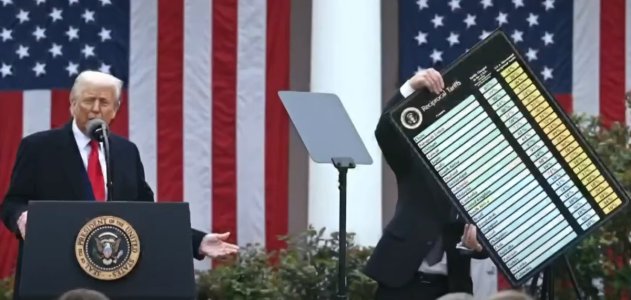The resurgence of American manufacturing: How tariffs are bringing jobs back home
By
Veronica E.
- Replies 0
In recent years, many Americans have felt the slow fade of domestic manufacturing—watching familiar jobs and industries shift overseas.
But that trend might be starting to reverse.
A growing number of companies are now moving production back to the United States, thanks in part to new tariff policies.
For some, it’s about logistics or cost. For others, it’s a chance to reinvest in American workers and communities.
Since President Trump's second term began, the White House has been abuzz with announcements from companies expanding their US production capabilities.
While tariffs remain a debated topic, they’ve clearly influenced many corporations to reassess where they manufacture goods.

The broad reach of these tariffs has affected multiple industries.
Critics warn that such sweeping measures might stifle growth, but others—including economists at Goldman Sachs—suggest they could spur job creation in certain sectors by encouraging demand for American-made products.
Here are some of the notable businesses that have committed to US manufacturing—moves that could bring thousands of jobs and mark a renewed era for American industry:
1. Abbott Laboratories
Abbott Laboratories, a medical device company based in Illinois, announced that it will launch a $500 million investment in its manufacturing and R&D facilities in Illinois and Texas by the end of the year.
The expansion is expected to create up to 300 jobs across the two states.
Abbott produces medical devices globally, and many of these are affected by country-specific tariffs, which President Trump has temporarily suspended for 90 days.
Also read: Tariff plan paused—Trump steps back after market chaos shakes investors
2. Apple
In February, Apple announced a $500 billion commitment to expand its US manufacturing over the next four years — the largest in the company’s history.
It plans to grow operations in several states, including Texas, California, and Michigan, and will build a new 250,000-square-foot factory in Houston, set to open in 2026, to produce servers for Apple Intelligence, its AI platform.
“We are bullish on the future of American innovation,” said CEO Tim Cook. “We’re proud to build on our long-standing US investments with this $500 billion commitment to our country’s future.”
3. Johnson & Johnson
Johnson & Johnson plans to invest over $55 billion in new US manufacturing over the next four years—a 25% increase from the previous period, the company said in March.
“Today’s announcements accelerate our nearly 140-year legacy as an American innovation engine,” said Chairman and CEO Joaquin Duato, highlighting a new high-tech facility breaking ground in North Carolina.
The site will produce advanced medications for cancer and other serious conditions, while also creating US-based jobs.
The company also plans to expand capacity at its existing plants, aiming to create more “high-paying, high-technology jobs.”
Also read: Tariff trouble? Why a growing boycott from Canada could cost American tourism $6 billion
4. Honda Motor
Honda Motor announced it will shift production of its Civic Hybrid Hatchback from Japan to the US in response to new tariffs, including a 25% levy on imported vehicles and auto parts.
Currently made in both Japan and Indiana, the hybrid model will be produced exclusively in Indiana starting later this year, according to American Honda spokesperson Chris Abbruzzese.
5. Hyundai Motor Company
In March, Hyundai announced a $21 billion investment in US manufacturing from 2025 to 2028. Of that, $9 billion will go toward expanding car production to 1.2 million vehicles a year.
“Hyundai Motor Group is deepening its partnership with the United States,” the company said, adding that the move will expand operations and grow its American workforce.
Also read: SNL cold open features Trump parody addressing tariff reversal and economic fallout
6. Nvidia
Last week, Nvidia announced it will begin manufacturing chips and AI supercomputers in the US for the first time in company history.
The tech firm is building over a million square feet of production space in Arizona and Texas, aiming to deliver up to half a trillion dollars’ worth of AI infrastructure.
“The engines of the world’s AI infrastructure are being built in the United States for the first time,” said CEO Jensen Huang, noting the move will strengthen supply chains and help meet growing demand.
7. TSMC
In March, Taiwanese chipmaker TSMC announced a total $165 billion investment in US manufacturing, adding $100 billion to its existing $65 billion operations in Phoenix.
The expansion includes plans for three new plants, two advanced packaging facilities, and a major research and development center, according to the company.
These investments reflect more than corporate strategy—they may mark a significant shift in how and where goods are produced.
For our readers, this return to “Made in the USA” may stir up memories of a time when American factories were central to local life and economic stability.
While decisions to manufacture domestically depend on many variables—like energy costs, labor, taxes, and regulation—tariffs are playing a visible role.
And for younger generations, this could be the beginning of a renewed respect for American craftsmanship and innovation.
Read next: Discover 7 groceries immune to tariffs: How to outsmart rising prices at the store

We’d love to hear your take: Do you think these moves will make a difference? Are tariffs a good way to support American jobs? Let us know in the comments below!
But that trend might be starting to reverse.
A growing number of companies are now moving production back to the United States, thanks in part to new tariff policies.
For some, it’s about logistics or cost. For others, it’s a chance to reinvest in American workers and communities.
Since President Trump's second term began, the White House has been abuzz with announcements from companies expanding their US production capabilities.
While tariffs remain a debated topic, they’ve clearly influenced many corporations to reassess where they manufacture goods.

Some companies are putting more money into US factories as new tariffs take effect. Image Source: YouTube / MSNBC.
The broad reach of these tariffs has affected multiple industries.
Critics warn that such sweeping measures might stifle growth, but others—including economists at Goldman Sachs—suggest they could spur job creation in certain sectors by encouraging demand for American-made products.
Companies taking the leap
Here are some of the notable businesses that have committed to US manufacturing—moves that could bring thousands of jobs and mark a renewed era for American industry:
1. Abbott Laboratories
Abbott Laboratories, a medical device company based in Illinois, announced that it will launch a $500 million investment in its manufacturing and R&D facilities in Illinois and Texas by the end of the year.
The expansion is expected to create up to 300 jobs across the two states.
Abbott produces medical devices globally, and many of these are affected by country-specific tariffs, which President Trump has temporarily suspended for 90 days.
Also read: Tariff plan paused—Trump steps back after market chaos shakes investors
2. Apple
In February, Apple announced a $500 billion commitment to expand its US manufacturing over the next four years — the largest in the company’s history.
It plans to grow operations in several states, including Texas, California, and Michigan, and will build a new 250,000-square-foot factory in Houston, set to open in 2026, to produce servers for Apple Intelligence, its AI platform.
“We are bullish on the future of American innovation,” said CEO Tim Cook. “We’re proud to build on our long-standing US investments with this $500 billion commitment to our country’s future.”
3. Johnson & Johnson
Johnson & Johnson plans to invest over $55 billion in new US manufacturing over the next four years—a 25% increase from the previous period, the company said in March.
“Today’s announcements accelerate our nearly 140-year legacy as an American innovation engine,” said Chairman and CEO Joaquin Duato, highlighting a new high-tech facility breaking ground in North Carolina.
The site will produce advanced medications for cancer and other serious conditions, while also creating US-based jobs.
The company also plans to expand capacity at its existing plants, aiming to create more “high-paying, high-technology jobs.”
Also read: Tariff trouble? Why a growing boycott from Canada could cost American tourism $6 billion
4. Honda Motor
Honda Motor announced it will shift production of its Civic Hybrid Hatchback from Japan to the US in response to new tariffs, including a 25% levy on imported vehicles and auto parts.
Currently made in both Japan and Indiana, the hybrid model will be produced exclusively in Indiana starting later this year, according to American Honda spokesperson Chris Abbruzzese.
5. Hyundai Motor Company
In March, Hyundai announced a $21 billion investment in US manufacturing from 2025 to 2028. Of that, $9 billion will go toward expanding car production to 1.2 million vehicles a year.
“Hyundai Motor Group is deepening its partnership with the United States,” the company said, adding that the move will expand operations and grow its American workforce.
Also read: SNL cold open features Trump parody addressing tariff reversal and economic fallout
6. Nvidia
Last week, Nvidia announced it will begin manufacturing chips and AI supercomputers in the US for the first time in company history.
The tech firm is building over a million square feet of production space in Arizona and Texas, aiming to deliver up to half a trillion dollars’ worth of AI infrastructure.
“The engines of the world’s AI infrastructure are being built in the United States for the first time,” said CEO Jensen Huang, noting the move will strengthen supply chains and help meet growing demand.
7. TSMC
In March, Taiwanese chipmaker TSMC announced a total $165 billion investment in US manufacturing, adding $100 billion to its existing $65 billion operations in Phoenix.
The expansion includes plans for three new plants, two advanced packaging facilities, and a major research and development center, according to the company.
These investments reflect more than corporate strategy—they may mark a significant shift in how and where goods are produced.
For our readers, this return to “Made in the USA” may stir up memories of a time when American factories were central to local life and economic stability.
While decisions to manufacture domestically depend on many variables—like energy costs, labor, taxes, and regulation—tariffs are playing a visible role.
And for younger generations, this could be the beginning of a renewed respect for American craftsmanship and innovation.
Read next: Discover 7 groceries immune to tariffs: How to outsmart rising prices at the store
Key Takeaways
- Several major companies, including Johnson & Johnson, Abbott, and Apple, are boosting US manufacturing in response to new tariffs.
- Johnson & Johnson is investing $55 billion; Abbott, $500 million; and Apple, $500 billion.
- Honda, Hyundai, Nvidia, and TSMC also announced plans to expand US operations and build new facilities.
- Economists say tariffs play a role, but other factors like labor costs and regulations also influence decisions.
- Some experts warn that tariffs could have mixed effects on overall job growth.
We’d love to hear your take: Do you think these moves will make a difference? Are tariffs a good way to support American jobs? Let us know in the comments below!






